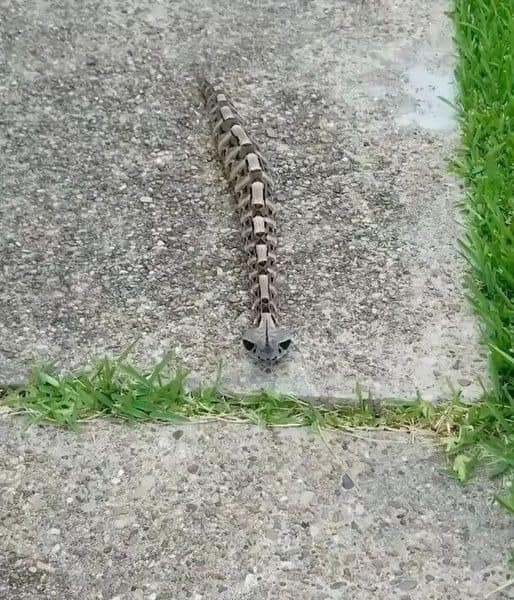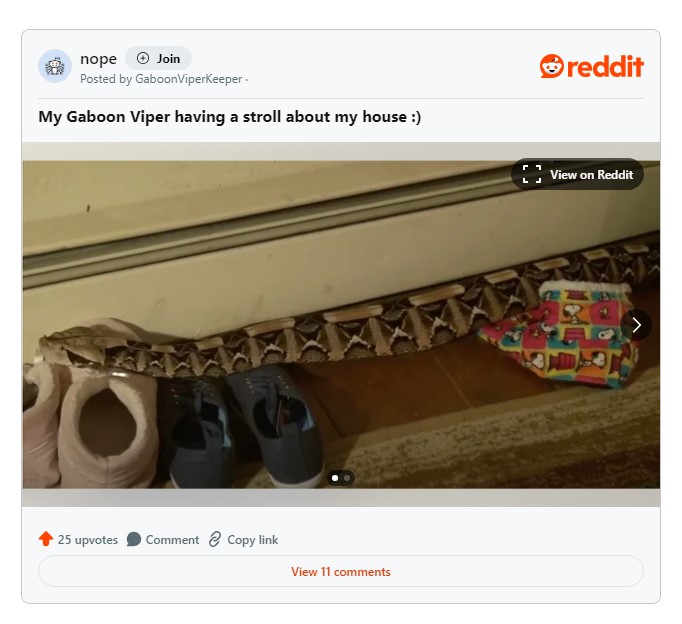In the depths of the African rainforests lies a true marvel of nature — the Gaboon Viper. This captivating serpent possesses a mesmerizing blend of cool camouflage, potent venom, and unparalleled hunting skills.
Today, we delve into the intriguing world of this unique animal, uncovering the secrets behind its unique traits and its reign as one of Africa’s most formidable predators…
The Gaboon Viper, also called the Gaboon adder, ranks as one of the largest and deadliest vipers on the African continent. Hailing from the lush rainforests and dry savannas of Central and West Africa, this elusive serpent is renowned for its vibrant and intricate camouflage, making it a true master of disguise.

The snakes are only outweighed by exceptionally large King Cobras, they exceed 6 feet in length and weigh more than 20 pounds.
What’s even more spine-chilling is that this snake possesses fangs that hold the record for being the longest among all venomous serpents, measuring up to a staggering 2 inches in length. The Gaboon Viper also possesses one of the most potent venom deliveries in the snake world.
Its venom, a potent cocktail of enzymes and toxins, is capable of causing severe tissue damage, leading to excruciating pain, and if left untreated, can be potentially fatal in consequence.
The head is large and triangular but it’s the serpent’s intricate skin patterns that truly captivates the imagination. The excellent camouflage makes the snake blend perfectly into the leaf litter on the forest floor – it’s almost impossible to discover it before it strikes.
The Gaboon Viper employs a patient and strategic approach to ambush its prey – it’s a very patient creature who spends long periods motionless before the attack. Feasting on fully grown rabbits, monkeys, and occasionally even the small royal antelope. This voracious predator showcases its incredible appetite and also its ability to consume sizable prey.
Fortunately, human encounters and snakebites involving this species are rare. Due to its preference for remote habitats and generally non-aggressive behavior, reported cases of attacks on humans remain scarce. However, when such incidents occur, they are often a result of unintentional encounters where individuals inadvertently step on the snake.

In these unfortunate situations, the consequences can fatal if anti-venom is not obtained. Notably, this viper possesses the unique ability to hold onto its prey after biting, allowing for the injection of larger quantities of venom into the bloodstream.
As mentioned, the Gaboon viper is naturally found only in Africa. However, that hasn’t stopped some Americans from keeping them as pets in their homes.
Due to its status as the largest viper in the world and its striking appearance, the Gaboon viper attracts snake enthusiasts who are eager to have one as a pet. However, sometimes this choice can have disastrous consequences – and that’s precisely what happened in Virginia in 2022.
According to reports, a man that was keeping the deadly snake as a pet got bitten. Police were called to the scene, and the man was swiftly transported to Richmond Hospital and admitted to the emergency room in a race against time to save his life.
The situation was complicated by the fact that the VCU Medical Center had exhausted its supply of anti-venom, which had been provided by the Smithsonian National Zoo. However, in a commendable effort, the Virginia Aquarium and Marine Science Center in Virginia Beach contributed an additional 35 bottles of anti-venom to assist in the treatment.
It appears that 2022 was an unfortunate year for Gaboon owners – because just a few months prior to the Virginia incident, there were reports of a Gaboon Viper biting a man in North Carolina. The man required 44 vials of anti-venom and tragically lost several fingers in the process.
Fortunately, the likelihood of encountering this venomous snake in the United States is extremely low, although there have been reports of Gaboon Vipers escaping into the wild. In 2015, the Georgia Department of Natural Resources reported a possible sighting of the deadly snake in Milledgeville, Georgia.
In 2021, a video shared by The Reptile Report went viral on social media. It featured a Gaboon Viper spotted on the street, and people were captivated by its remarkable camouflage against the surroundings. And when it moved, it almost looked like a caterpillar! The video garnered significant attention, and it’s easy to see why – what an incredible creature this is:
The Gaboon Viper stands as a testament to the wonders of nature, showcasing its remarkable ability to adapt, survive, and thrive in the African rainforests.
As we peel back the layers of its enigmatic existence, we gain a newfound appreciation for the delicate balance of power and beauty that defines the natural world – share this article if you agree!




